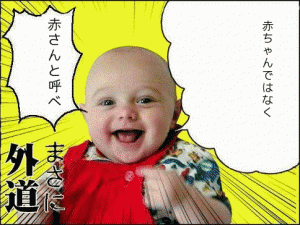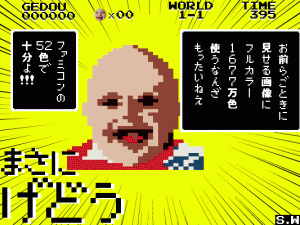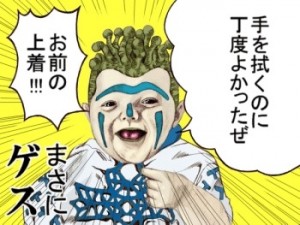 When parents post their kids’ photos on the Internet, they often do so with a bit of trepidation, fearful (almost always without reason) that they’re inviting stalkers into their lives or, less traumatically, exposing too much of their private sphere to public view. What most fail to consider is the possible upside—that the perfect photo of their adorable baby will be adopted by Japanese Photoshoppers, who will transform it into something fascinating, mutable and alien—a meme only they understand.
When parents post their kids’ photos on the Internet, they often do so with a bit of trepidation, fearful (almost always without reason) that they’re inviting stalkers into their lives or, less traumatically, exposing too much of their private sphere to public view. What most fail to consider is the possible upside—that the perfect photo of their adorable baby will be adopted by Japanese Photoshoppers, who will transform it into something fascinating, mutable and alien—a meme only they understand.
This is pretty much what happened to Allen S. Rout, a University of Florida “computer geek,” who in 2000 posted on his personal Website a photo of his infant son, Stephen, with the caption “We’re really blessed. Stephen is an amazingly happy baby.” Recently, however, Allen Googled himself and found—deep in the results pages—the work of said Japanese photoshoppers, who’d turned the “happy baby” image into a bizarre, programmable graphic. Stephen had gone viral.
To find out how a family deals with such strange and sudden almost-fame, I spoke (via IM) with Allen and Stephen, who’s now 10 years old and “really, really, really” loves books.
Matt: Allen, how did Stephen become big in Japan?
Allen: Well, I had read an article talking about the prevalence of e.g. hiring committees checking one’s google reputation. It reminded me that I hadn’t googled myself for some time.
So I did so, and wandered until I was mostly encountering sports stories (‘Jim _ALLEN_ and his falcons _ROUT_ed the…’). Then I skipped 10 entries forward just for the heck of it. I noticed my name in the midst of some japanese characters, which weirded me out. I saw on the page some text that looked ripped from my old photo pages. I figured I had been scraped as filling for some anti-spam-filter chaff. Grist that looked real enough to be a real page.
But on one of the links off the page I saw that first image: the sunburst with talk bubbles around Stephen’s head. That’s the beginning.
Matt: So, some Japanese guy (or girl) was wandering around the ‘net, found your photo of Stephen, and started Photoshopping?

Allen: As far as I can tell. Successive searches have found that the same picture has been scraped by several stock image companies. Stephen currently ranks first in Google Image Search for ‘happy baby’.
Stephen: Out of thirty four and a half million!
Matt: Wow!
Allen: None of those sites credit or contacted me; his presence on them was a bit of a surprise.
Matt: Stephen, had you seen the original photo before your dad re-discovered it?
Stephen: No.
Matt: What did you think when you saw your baby-face surrounded by Japanese characters?
Stephen: I was amazed and wondering how on earth that happened.
Matt: Did you recognize yourself? Or did it seem like someone else?
Stephen: I wouldn’t have known it was me if it weren’t for the fact that Mom had previously told me that I was something of a meme, before we got home from something I was doing somewhere else.
Matt: Stephen, can you explain what a meme is?
Stephen: Uh. Someone who was mildly well known on the internet, or mildly from different degrees of well-known, I think.
Matt: Allen (and Stephen), why do you think the photo appealed to the Japanese Photoshoppers?
Stephen: I’m really not sure. Maybe they just like cute baby pictures? I must admit I do think that picture’s kind of cute. I’m not trying to be self-complimenting, it’s just an honest opinion.
Allen: I thought about that a while. I think there are just… eddies of style and opinion. It’s more or less random what catches someone’s fancy. I do think he seems almost excstatic in the shot. His joy kind of comes across. I think that’s sort of the ‘staring at mommy’ sort of joy, and since the camera was right there …. you get the full blast.
 Matt: Do you each have a favorite rendition of the photo?
Matt: Do you each have a favorite rendition of the photo?
Stephen: I like the first version.
Allen: That’s the base one with the fill-in-the-bubbles. I like the 8-bit, and am …. compelled… by the bust statuary. I want to find out if someone is actually selling those.
Matt: Have you gotten in touch with any of these… artists?
Allen: Nope. I’ve left comments on a few of the boards. But their comprehension of my English is likely as poor as mine of their Japanese.
Matt: Allen, back when you first posted the photo, it was 2000, the dawn of the era of social networking. Did you have any idea this sort of thing might happen? Or any trepidation about posting photos of your kid online?
Allen: Pish. I’m an old fart of the internet. I cut my teeth on USENET, and was cynical about public life before there _was_ a web. I think that our current popular neurosis about kid safety is drastically overblown. Stephen is so overwhelmingly safer than I was at his age, and I ranged far afield without concern from my parents.
We are a very very safe society, and the chance that someone seeing Stephen’s picture could materially impact his safety is silly-season (In My Humble Opinion).
Matt: IMHO, too. But has Stephen’s meme-ification changed anything? What happens when a private family picture goes viral? Does the picture still have the same personal resonance—do you see Stephen the happy baby or Stephen (Memephen?)?
Stephen: No opinion.
Allen: It’s changed something… but nothing has been taken away. Christine [his wife] and I discussed this at some length over dinner yesterday, musing to Stephen about the meaning of art. Baby pictures are a particularly pedestrian variety of art, but the principles apply just the same.
 When you complete a piece of art, when you release it, you let it go. At that point the “meaning” of the work is as much or more a matter of the observer than it is of the creator. And these images have gone through so many incremental transformations, so many generations of perception and reinterpretation. There is far more of “Japan Culture” in Stephen-snake-head than there is of Stephen, or Christine or Allen.
When you complete a piece of art, when you release it, you let it go. At that point the “meaning” of the work is as much or more a matter of the observer than it is of the creator. And these images have gone through so many incremental transformations, so many generations of perception and reinterpretation. There is far more of “Japan Culture” in Stephen-snake-head than there is of Stephen, or Christine or Allen.
So I see the original picture as the … trunk? Root? of some quixotic, absurd structure of humor and habit. And my relationship to it is tenuous at best.
Matt: Stephen, has this made you any more curious about how Japanese culture works? Or Internet culture in general?
Stephen: Not particularly.
Matt: Have you told your friends that you’re famous in Japan now?
Stephen: A few. I haven’t had contact with very many of my friends lately because I’ve been doing a lot of stuff in the last two weeks. I’ve been doing [a local college] “College for kids” and before that I was doing VBS (Vacation Bible School).
Matt: What did the friends you told think?
Stephen: I’m not really sure. Since I’ve told them I haven’t had lots of contact with them, and we’ve been talking about different subjects.
Matt: How would you react if one of your friends told you he’d suddenly become famous on the other side of the planet?
Stephen: For a bit, I might think he’d be joking, and eventually I’d be very amazed … and wondering how it happened.

This happened on an episode of the Simpsons. I forget the details but Homer becomes a huge star in Japanese commercials (pre-internet). Or something like that.
In this interview I’m struck by how blase they both are about this. I think it’s incredibly interesting and poese so many questions about fame, celebrity, art, culture, commerce, and much more. But the kid is all ‘wutevs’. BORING!
Well now, the real funny thing here is how the Japanese 2channelers misconstrue that happy face for one of shameless, sometimes petty villainy. I’d never seen the 8-bit one before, and it’s pretty funny, too. “Those 16-million color images are wasted on the likes of you chumps. … The NES’s 52 suit you just fine!!! (Truly outrageous/monstrous)”